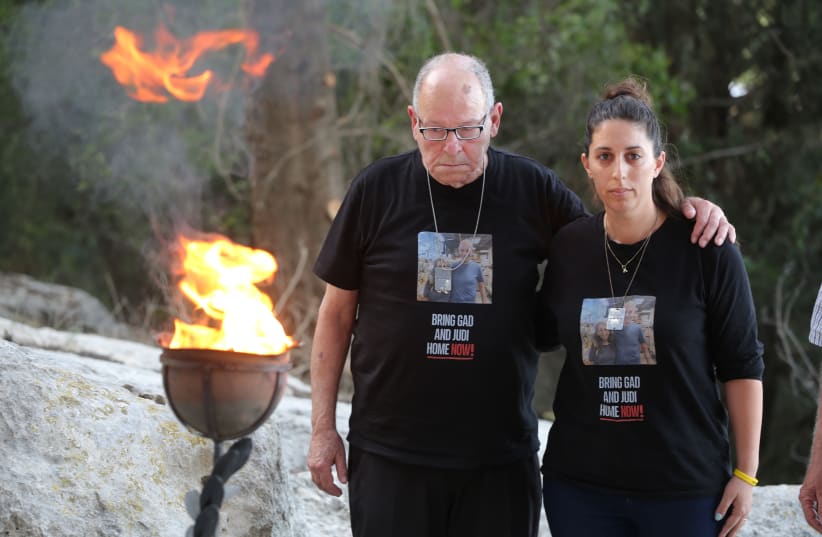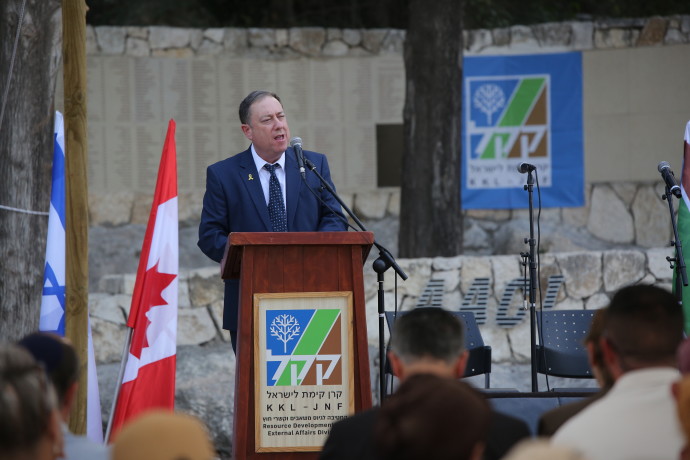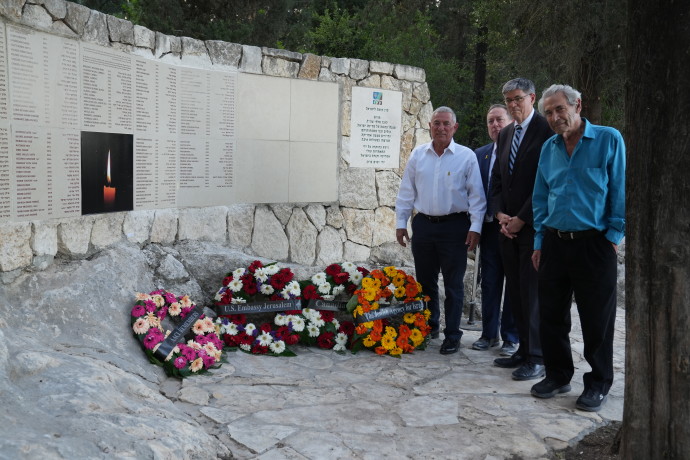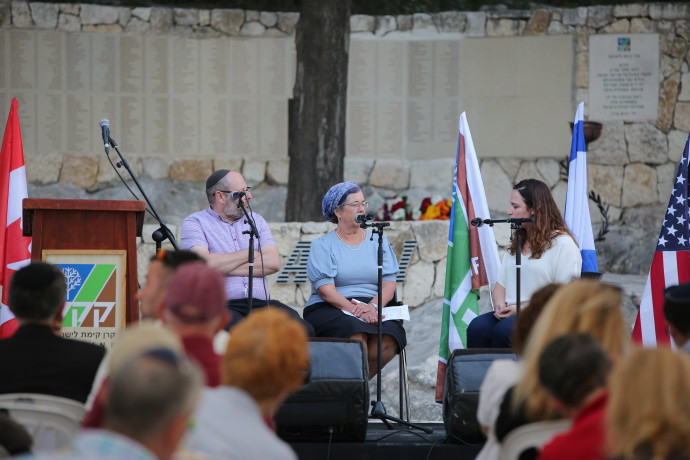Tucked away amid the rolling green hills near Shaar Hagai and Highway 1 leading to Jerusalem is the Remembrance Site of the Association of Americans and Canadians in Israel (AACI).
Its origins date back to 1967, when, shortly after the Six Day War, AACI, in conjunction with the Jewish National Fund, planted trees on the site in memory of North Americans who had fallen in battle in Israel’s wars.
In 1983, AACI erected its Memorial Wall, which bears the names of the fallen, and in 2003 the site was renovated with the assistance of KKL-JNF. The names engraved on the wall reflect the history and battles of the State of Israel, and some pre-date its establishment.
As part of this year’s memorial ceremony for North Americans who fell in military service to the State of Israel or as victims of terror, which was held on May 9, AACI introduced its commemorative website, www.aaciremembers.org, which honors the memory of individuals from English-speaking countries or members of AACI who have fallen in service to the state or as terror victims.
The website enables visitors to search the listing of the fallen by name, hometown, or year of birth and offers insights into their stories and the conflicts in which they perished.
This year’s commemoration, which was broadcast live to communities in Israel and North America, offered a diverse program that featured remarks from dignitaries; discussions and dialogue with parents of the fallen; an engaging and poignant video segment; prayers; and the unveiling of the names added to the Memorial Wall in the past year.
In his remarks, David London, the CEO of AACI, noted that before Oct. 7, there were 360 names on the organization’s Memorial Wall in the forest. Since that date, he said, 77 new names have been added. He expressed the hope that in future years, they will no longer have to add names to the Memorial Wall and the website.
London mentioned a second new program created by the organization – AACI Student Connect, which pairs Israeli and International Jewish university students to build one-on-one relationships. The program, developed in partnership with the Jewish Agency, has already attracted 400 registrants from 60 universities worldwide.
“Today, these efforts on university campuses are needed more than ever,” he said. “These one-on-one meetings build friendships and real relationships that will build a more united Jewish world.”US AMBASSADOR to Israel Jack Lew noted that more than 30 American citizens were murdered in the Hamas atrocities on Oct. 7, and 23 dual-national American Israelis have fallen in combat since that date. Lew added that he has had many difficult conversations with families of fallen soldiers, of kidnapped hostages, and of other innocent people murdered on Oct. 7.
“Amid the pain, I’ve seen unbounded resilience and endless resolve,” the ambassador said, adding that the US remains determined to bring the hostages home and end the conflict in a way that protects Israel’s safety and security.
The keynote address was delivered by Joseph Gitler, the founder of Leket Israel and father-in-law of Sgt.-Maj. (res.) David Schwartz, who fell in battle in Gaza. Gitler spoke movingly of his 26-year-old son-in-law, who was killed in battle in Khan Yunis on January 8.
Referring to North American olim, he said: “Every one of us here could have stayed put and had an easier life without the stresses of language, culture, no Sundays off, unremitting terror, and long military service.”While everyone who has come to Israel has sacrificed, he added, “No one has sacrificed like those whose names are etched on this monument, and that needs to be commemorated.”
Despite the tragic losses that have befallen the Jewish people, Gitler said, “We will carry on as the Jewish people have done for millennia, to continue building our homeland as a light unto the nations, even if often many of the nations seem blind to our light.”
Jewish Agency head Doron Almog invoked the memories of Staff-Sgt. Rose Lubin and Sgt. Binyamin Meir Airley, both 21 years old when they fell in battle.
Lubin, a native of Atlanta, Georgia, moved to Israel as a lone soldier to enlist in the IDF and was drafted to serve in the Border Police. On Oct. 7, while staying with her “adopted family” in Kibbutz Sa’ad near the Gaza Strip, she courageously defended the kibbutz against Hamas terrorists. A month later, on November 6, Lubin was murdered in a stabbing attack in the capital.
Airley, a member of the Paratroopers Brigade in the 101st Battalion, was born in New York and made aliyah to Ramat Beit Shemesh with his family in 2006. He was killed on November 18, 2023, fighting Hamas terrorists in the northern Gaza Strip.
Almog concluded his remarks with a prayer for the safe return of the hostages held in Gaza.
Among the names:
- Master Sgt. (res.) Rabbi Elisha Loewenstern, 38, killed in Gaza on December 14 while on a mission to rescue wounded soldiers. Though exempt from reserve army service, Loewenstern felt that it was his duty to defend the State of Israel, so he volunteered for service.
- Canadian-Israeli peace activist and women’s rights advocate Vivian Silver, 74, co-founder of Women Wage Peace, who was murdered by Hamas terrorists in Kibbutz Be’eri on Oct. 7.
- Sgt. 1st Class Amichai Yisrael Yehoshua Oster, 24, who was vacationing in Salt Lake City, Utah, when he learned of the Oct. 7 Hamas invasion. Oster immediately returned home and joined his IDF reserve unit. He was killed by an explosive device in northern Gaza on January 1.
- Master-Sgt. (res.) Ari Zenilman, 32, a graduate of Yeshivat Har Etzion and data analyst for Mobileye, whose third child was born on September 29. Zenilman was killed in battle in Khan Yunis on December 10.London says that the oldest name on the wall is that of Jacob Tucker, who fell in the Battle of Tel Hai. Tucker was born in 1896 in Bialystok, Poland, and moved to the US while a teen. During World War I, he joined the British Army and reached Palestine with his battalion. He remained there after his discharge in February 1920. In response to the call by Joseph Trumpeldor to protect the Galilee, he joined the defenders of Tel Hai and was killed there on March 1, 1920.
ONE OF the most well-known names etched on the AACI Memorial Wall is that of Col. David Michael (Mickey) Marcus, a graduate of the US Military Academy at West Point who served in World War II. In 1948, David Ben-Gurion recruited Marcus as a military consultant, and he helped transform the nascent Israeli army into a professional fighting force. Marcus was mistakenly killed on June 10, 1948, by an Israeli sentry at Abu Ghosh because he didn’t understand his Hebrew request for a password. He was 47 years old.
Judi Weinstein, a 70-year-old woman who held Israeli, American, and Canadian citizenship, and her Israeli-American husband, 73-year-old Gadi Haggai, were murdered on Oct. 7 by Hamas terrorists in Kibbutz Nir Oz. At the memorial ceremony, a video about their lives was screened for the audience. A panel discussion with Binyamin Meir’s father, Robert Airley, and Ari’s mother, Lisa Zenilman, was moderated by Atara Volk Itzchaki, AACI director of projects.
“Binyamin had no fear,” his father said. “He gave his life for the Jewish people. He would do it all over again.”Recalling her son, Zenilman said, “I don’t think any of these boys set out to be heroes. Ari became a hero, even though that’s what he never set out to be.”
Pointing to the names on the Memorial Wall, she said, “They’re all heroes – every single one of them.”This article was written in cooperation with AACI.



